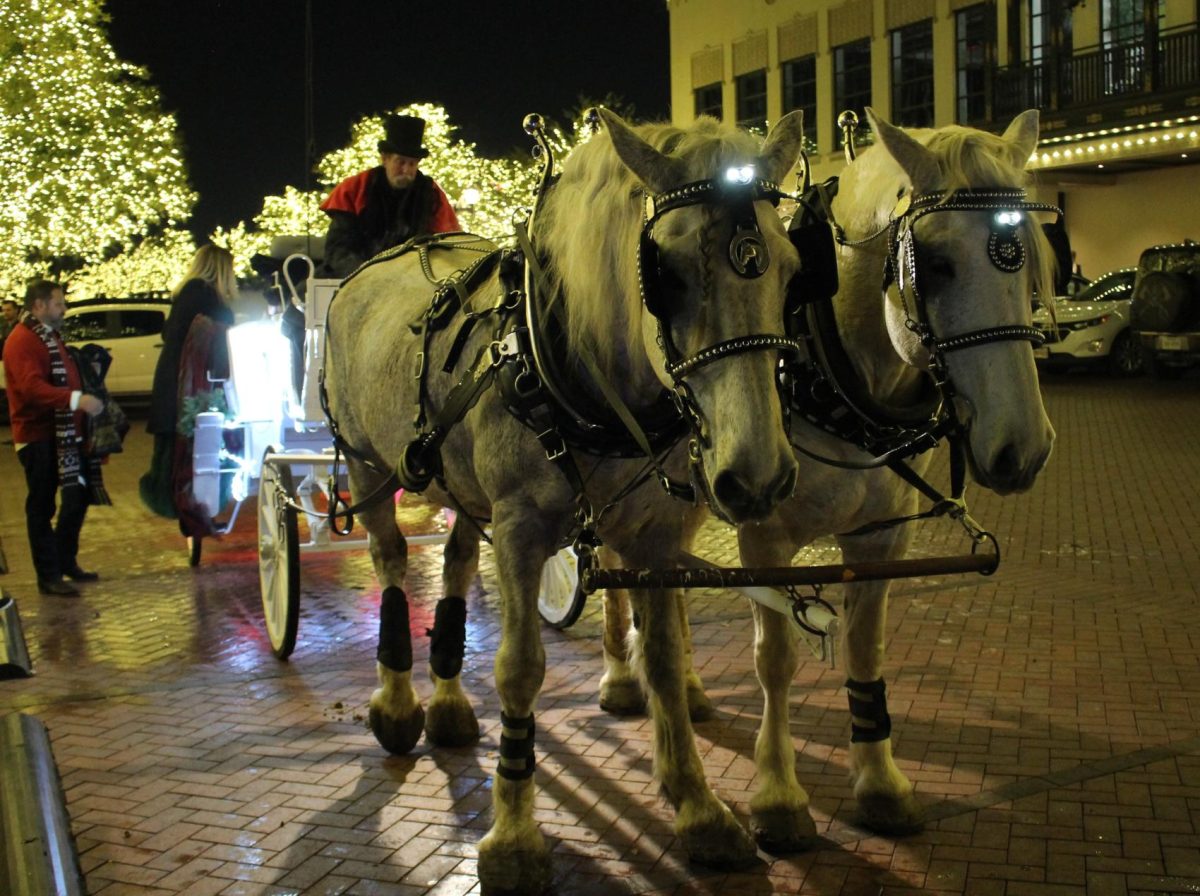Whether you think the holidays start on Nov. 1 or Dec. 1, there’s no arguing that Christmas lights start popping up the second Halloween ends, especially in the Park Cities where there is a culture around having the most extravagant Christmas lights.
But as Christmas lights appear, so do the horse-drawn carriages that ride around the streets of the Park Cities through November and December. The customers may enjoy the lights and the festive atmosphere, but this tradition is founded in an egregious abuse of animals and has other consequences for members of the community. These horses are not even allowed their most basic functions while profiting businesses, the carriages are nuisances for residents and the regulations are proven easy to implement.
The well-known non-profit People for the Ethical Treatment of Animals (PETA) states that buggy horses are forced to work in all-weather conditions, dodge traffic and walk all-day long while carrying around heavy carriages.
Moreover, horses aren’t protected under the Animal Welfare Act and many laws protecting animals from abuse don’t cover horses. Horses are forgotten animals that get exploited and used as tax-free vehicles. In Highland Park, there are no laws protecting these animals at all.
Horses will spend hours walking and trotting on hard asphalt. Over long periods of time, this can cause laminitis, a horse hoof disease, and inflammation which separates the bone from the hoof. Horses need their shoes to be replaced quite frequently to adequately protect their hooves and make sure their weight is distributed evenly. Additionally, buggy horses are forced to breathe in vehicle exhaust fumes day in and day out. This can cause respiratory problems and lung diseases.
Another problem with the urban environment is that horses are extremely skittish animals. The sounds of construction vehicles, traffic and the startling wails of ambulances, fire trucks, and police cars all pose a danger to the horses and the people involved.
A horse can spook at these sounds and suddenly sprint down the street, causing severe accidents and injuries. They can trip on tree branches and electrical wires, all of which pose threats to bystanders as well as the horse itself. Public roads and streets are simply not safe places for horses.
These animals are not even allowed to function properly, with poop bags shoved under their tails to prevent their waste from falling on the streets of the suburbs. Considering that the horses are the foundation of such a profitable business, with one carriage ride for four people costing $400, there need to be regulations protecting the working-class laborers.
If the blatant abuse of animals isn’t enough to convince the community to prohibit horse-drawn carriages, buggy rides are also a nightmare for vehicle drivers on the road. Especially on the small streets that make up the Park Cities, a car cannot maneuver around a horse and is instead stuck behind the 10 mph carriage, slowing down traffic for several blocks.
Many cities across the US, such as Salt Lake City, Key West, Treasure Island, and Pompano Beach have already banned these carriage rides, and starting June 1, 2024 horse-drawn carriages will be banned in New York City. These examples are proof that human empathy can outweigh profit. There is no reason that these bans can’t be easily replicated in the Park Cities.
Horse carriage proponents argue that in places like New York City, horse carriage bans could have an effect on tourism, but we should not prioritize monetary benefit over ethical treatment of animals. Eliminating the buggy ride business will reduce unnecessary holiday traffic and help the horses that are being abused by the industry.
Despite this, I think it’s important to recognize that not all owners of these businesses are horse-abusing monsters. These business owners are not all intentionally mistreating and neglecting horses, however, they are all guilty of placing horses in unsafe environments.
Animal abuse is a serious and ugly problem that has been a part of our society for centuries. It is inexcusable, and we must strive for a more ethical and humane relationship with animals, including horses. Banning carriage rides is not a hard change, but it is one that needs to happen.




